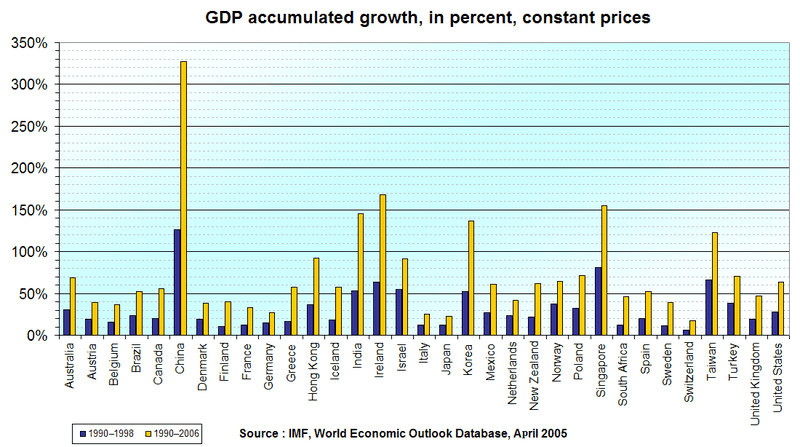
It’s difficult to express how important and worthwhile analysis this is.
Chris Tolles points us to what I have to say is an absolute must read piece by Jim Manzi (who I haven’t always agreed with in the past), exploring the biggest challenge the US faces in going forward. It’s difficult to express how important and worthwhile analysis this is. I don’t agree with everything, but it frames the issues in ways that are incredibly helpful. There’s very little I disagree with in the first half, which highlights the basic struggle that the US faces in really clear terms: innovation is necessary for economic growth, and less government interference is key for the type of innovation we need. However, with such innovation comes social upheaval and disruption that creates a different set of problems that could be just as bad for the US:
Our strategic situation is shaped by three inescapable realities. First is the inherent conflict between the creative destruction involved in free-market capitalism and the innate human propensity to avoid risk and change. Second is ever-increasing international competition. And third is the growing disparity in behavioral norms and social conditions between the upper and lower income strata of American society.
These realities combine to form a daunting problem. And the task of resolving it turns out not, by and large, to be a matter of foreign policy. Rather, it compels us to consider how we balance economic dynamism and growth against the unity and stability of our society. After all, we must have continuous, rapid technological and business-model innovation to grow our economy fast enough to avoid losing power to those who do not share America’s values — and this innovation requires increasingly deregulated markets and fewer restrictions on behavior. But such deregulation would cause significant displacement and disruption that could seriously undermine America’s social cohesion — which is not only essential to a decent and just society, but also to producing the kind of skilled and responsible citizens that free markets ultimately require. Moreover, preserving the integrity of our social fabric by minimizing the divisions that can rend society often requires government policies — to reduce inequality or ensure access to jobs, education, housing, or health care — that can in turn undercut growth and prosperity. Neither innovation nor cohesion can do without the other, but neither, it seems, can avoid undermining the other.
There’s a lot in the piece that I wanted to quote, but you should just go read the whole thing yourself. Manzi basically points out the difficulty in pulling any of the levers: if you increase the pace of innovation, you also increase social upheaval at the lower end of the pyramid. But if you work to protect social upheaval, you decrease the pace of innovation, and in a global economy, that can actually lead to another set of problems that, in turn, also could result in serious problems for the economy.
It’s a really sobering picture that is inherently non-partisan, and highlights how the views and plans of both major political parties, when implemented by people who don’t understand these countervailing forces, is likely to make the overall situation worse, not better.
The Latest on: Innovation and social upheaval
[google_news title=”” keyword=”Innovation and social upheaval” num_posts=”10″ blurb_length=”0″ show_thumb=”left”]
via Google News
The Latest on: Innovation and social upheaval
- Technology & Innovationon May 8, 2024 at 5:00 pm
Technological innovations have produced robots capable of jobs that, until recently, only humans could perform. The present research explores the psychology of "botsourcing"—the replacement of human ...
- Tackling climate change with social scienceon May 8, 2024 at 10:22 am
Tackling the climate challenge is requiring everyone to change the way we think about our homes, our lifestyles, and our investments. Australians are embracing the energy transition, with rooftop ...
- 'Intellectual influencers' will soon be taking over your social-media feedson May 8, 2024 at 8:43 am
The barrier to influencing is lower than ever, meaning viewers are more discerning, and content creators have to think about what they're offering.
- What Funders misunderstand most about funding social change innovationon May 8, 2024 at 12:05 am
The last decade has seen a raft of big new ideas about innovating financing models for social enterprises. Philanthropic organisations and program investors have been overwhelmed with gurus promising ...
- After a Tough Year for Classroom Innovation, It’s Time for a Reseton May 7, 2024 at 9:46 am
How to better support instructors in the face of faculty backlash against the demands of student-centered teaching.
- Looking into the dark reign of Seyyed Ali Khamenei - opinionon May 5, 2024 at 5:46 am
Under Khamenei, Iran has experienced an alarming intensification of state control and a severe curtailment of personal freedom, unmatched in its modern history.
- Four years after the pandemic's upheaval, a change of ownership at Corinthian Eventson May 2, 2024 at 7:22 am
Three years after a Boston events business was brought to a standstill by Covid-19, the company is now back to their pre-pandemic headcount, exceeding their pre-pandemic revenue, and taking on another ...
- What Is Social Listening And How To Get Startedon May 1, 2024 at 5:00 pm
Learn what social listening is, why it matters, and our top tips for getting started with your social listening strategy in this article. Most marketers now understand the value of social media as ...
- Balancing Innovation and Employment: Navigating the Impact of Artificial Intelligenceon April 29, 2024 at 5:54 pm
In the rapidly evolving landscape of technology, the advent of Artificial Intelligence (AI) has sparked both awe and apprehension. While hailed for its potential to revolutionize industries and ...
- Uranus and Jupiter to make once-in-14-year meet up and it will impact all of uson April 20, 2024 at 12:48 pm
The malefic planet, Jupiter, will be meeting up with the planet of disruption, Uranus, in a rare once-in-every-14-year transit. This is how it will impact us.
via Bing News










